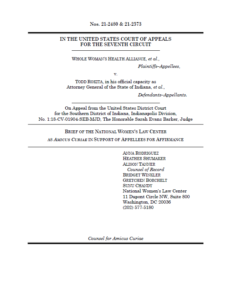On November 18, 2020, the National Women’s Law Center filed an amicus brief to the Seventh Circuit in Whole Woman’s Health Alliance v. Rokita. In this case, abortion providers challenged several state laws that delay and outright deny Hoosiers’ access to abortion. The challenged laws include medically unnecessary restrictions on abortion providers, burdensome facility requirements, biased counseling requirements, a ban on abortion via telemedicine, and laws that effectively create a two-trip requirement for Hoosiers that already struggle to reach care.
The brief urges the Seventh Circuit to affirm the lower court’s judgement which rightly considered the existing economic, social, and public health disparities that many Hoosiers face, including how those disparities interact with the delay and the denial of abortion care caused by the abortion restrictions. The Center describes the devastating adverse consequences to people’s economic security, health, safety, and autonomy that would continue if the challenged abortion restrictions are permitted to remain in effect in Indiana. We highlight the effect it would have for families living in rural Indiana, which have limited access to public transportation, worse health outcomes and access, and worse employment and childcare inequalities, making the abortion restrictions even harder to overcome. Further, the Center argues that for those with histories of reproductive oppression, forcing them to carry pregnancies and endure the risks that come with unwanted pregnancies, the State is continuing a legacy of reproductive coercion. And finally, we argue, given this context and the fact that Indiana fails to provide the support that women and other people who can become pregnant need to thrive, the abortion restrictions create an unconstitutional barrier to abortion access.

